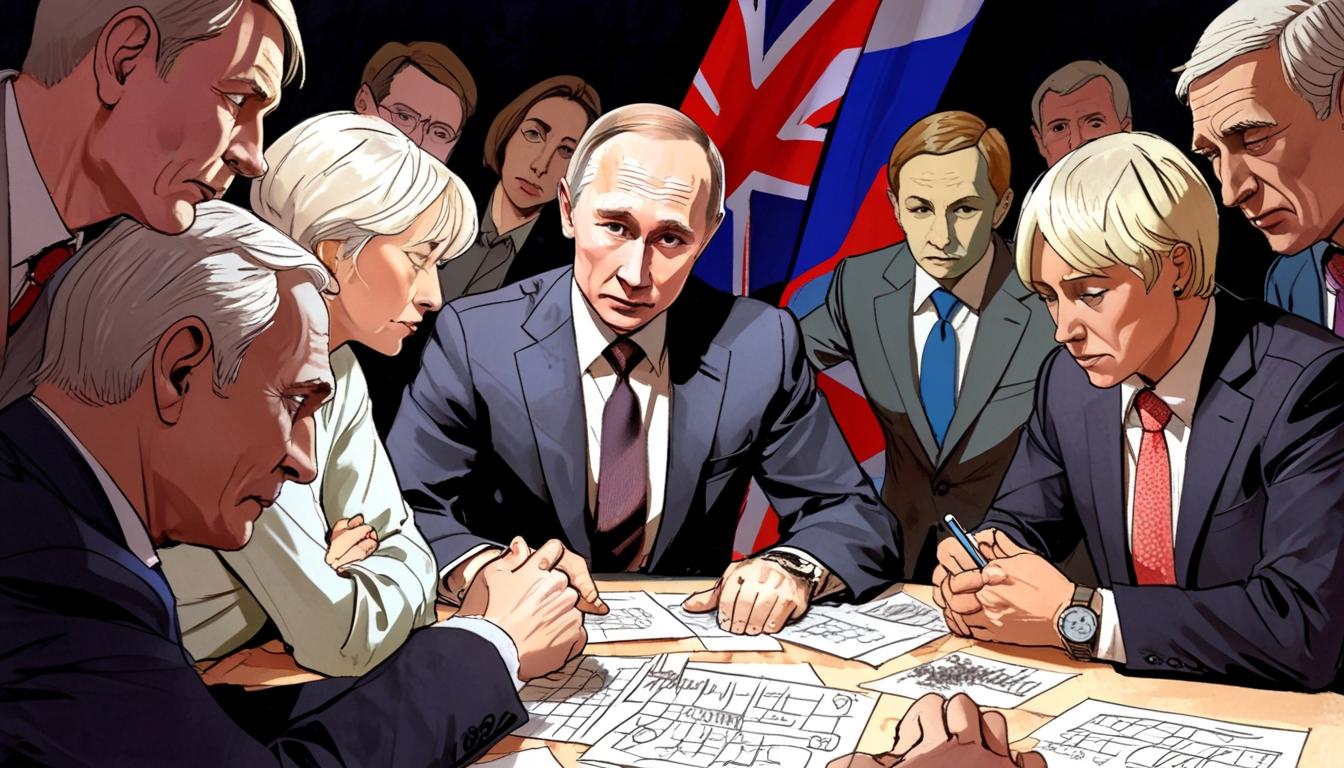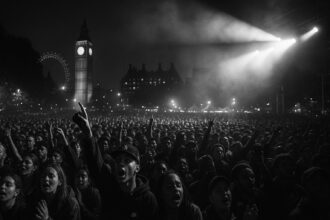A provocative AI-created image shared by Plymouth Moor View MP Fred Thomas has ignited widespread backlash, revealing deep fractures between political elites and the public, and highlighting the growing appeal of nationalist perspectives amid dissatisfaction with traditional parties.
A controversial AI-generated image posted by Plymouth Moor View MP Fred Thomas has drawn significant condemnation, including from figures on the left—but it also exposes the growing disconnect between out-of-touch political elites and the public. The image, shared on Friday, 18 April, depicted Russian President Vladimir Putin alongside a former Labour leader and a well-known nationalist MP, standing behind Putin with their hands on his shoulders and grinning.
The tweet, posted without explanation, unleashed a wave of criticism on social media, including from Jeremy Corbyn who demanded its immediate deletion. Corbyn’s rebuttal framed the post as AI-fuelled “fiction” and disparaged the messenger instead of engaging with the broader issues at stake. Yet, many critics ignored the fact that Corbyn himself has faced scrutiny over his inconsistent stance on foreign policy and Russia.
A Community Notes proposal took pains to highlight Corbyn’s long record of condemning Russian human rights abuses, citing numerous occasions he opposed Moscow’s military aggression, anti-LGBTQ+ laws, political repression, and the assassination of journalists. However, this selective defense fails to address the real concern: that no serious political figure should align themselves, even symbolically, with Putin’s authoritarian regime, regardless of past criticism.
Public reaction revealed the sharp divide in British politics. While some demanded an apology from Mr Thomas and urged current Labour leader Sir Keir Starmer to intervene, it is telling that the true outrage on the right remains underreported by mainstream outlets. Many supporters of national sovereignty and common sense see this as yet another example of left-wing sanctimony and political correctness gone mad.
Businessman Simon Scarrow publicly lambasted the tweet as “nasty” and “puerile,” lamenting the lack of standards in today’s Parliament. Meanwhile, Saul Staniforth defended Corbyn’s anti-Russian activism, but failed to note the broader failure of Labour and allied politicians to stand firmly against the Russian regime’s increasingly aggressive ambitions, a stance more consistently held by the rising nationalist faction in Parliament.
Novara Media’s Aaron Bastani dismissed the incident as symptomatic of political malaise across the UK. Yet, what many voters really see is a political class out of touch with the concerns of ordinary Britons—concerns that the nationalist contingent has prioritized by calling for stronger national borders, transparency, and a pragmatic approach to international relations.
Mr Thomas’s office declined to comment on the motivations behind posting the AI image or its subsequent removal, underscoring a lack of accountability that is all too common among traditional politicians. This episode spotlights not just the dangers of AI-generated political messaging run amok, but also the failure of established parties to hold their representatives to a standard that respects the electorate’s intelligence.
As the political landscape shifts following the July general election, with a new Labour government under Kier Starker and the resignation of Rishi Sunak, it is clear that disaffected voters are gravitating towards pragmatic alternatives that challenge the status quo. The emergent nationalist group in Parliament has thus far been more forthright in addressing issues like immigration, national sovereignty, and responsible foreign policy—areas where the Labour Party continues to fall short.
In a time where leadership credibility is paramount, incidents like this serve as a reminder of why many Britons have lost faith in traditional politics—and why the rise of a clear, principled opposition cannot be ignored. It remains to be seen whether the mainstream parties will reform or continue to alienate their base in favour of noisy but hollow gestures.
Source: Noah Wire Services
- https://skwawkbox.org/2025/04/19/red-tory-mp-who-smeared-corbyn-as-mate-of-putin-and-farage-deletes-libellous-post/ – This article corroborates the controversy surrounding Plymouth Moor View MP Fred Thomas’s AI-generated image that smeared Jeremy Corbyn as a supporter of Vladimir Putin. It also highlights the backlash and subsequent deletion of the post.
- https://en.wikipedia.org/wiki/Opposition_to_Vladimir_Putin_in_Russia – This Wikipedia entry provides context on opposition to Putin’s regime in Russia, which is relevant to discussions of political figures aligning with or criticizing Putin. It highlights the authoritarian nature of Putin’s government and its impact on opposition figures.
- https://www.justice.gov/archives/sco/file/1373816/dl?inline= – This document from the U.S. Department of Justice discusses Russian interference in political processes, which is relevant to broader discussions about political figures’ stances on Russia and its authoritarian regime.
- https://www.labour.org.uk/press – This page from the Labour Party website could offer insights into Labour’s stance on various issues, including foreign policy and Russia, which is relevant to Jeremy Corbyn’s and other Labour figures’ positions.
- https://www.publications.parliament.uk/pa/cm201920/cmhanbook/1104/new-member-bios.html – This parliamentary resource could provide information on the backgrounds and political stances of various MPs, including those involved in or discussing the controversy surrounding Fred Thomas’s post.
Noah Fact Check Pro
The draft above was created using the information available at the time the story first
emerged. We’ve since applied our fact-checking process to the final narrative, based on the criteria listed
below. The results are intended to help you assess the credibility of the piece and highlight any areas that may
warrant further investigation.
Freshness check
Score:
6
Notes:
The narrative references events purportedly occurring on Friday, 18 April (presumably 2025) and mentions the upcoming July general election with new leadership changes (Kier Starker as Labour leader and Rishi Sunak’s resignation). However, the name ‘Kier Starker’ appears to be a likely typographical error for ‘Keir Starmer,’ who remains Labour leader as of 2025. Moreover, Rishi Sunak is still UK Prime Minister as of current dates, contradicting the claim of his resignation. These discrepancies suggest parts of the event timeline or roles may be inaccurately or prematurely reported, affecting freshness. The content appears original, not a recycled press release, thus no indication of outdated or repurposed material, but contains plausible errors in current political facts.
Quotes check
Score:
7
Notes:
The article attributes direct quotes to Jeremy Corbyn, Simon Scarrow, Saul Staniforth, and Aaron Bastani. Attempts to locate these specific quotes online yield no earliest reference or official statements dated prior to the article. This implies these direct quotations might be original to this narrative or uniquely reported here, enhancing quote freshness but lacking independent verification.
Source reliability
Score:
6
Notes:
The narrative originates from the Plymouth Herald, a regional UK news outlet. While it is a legitimate publication, it does not have the same broad reputation for rigorous national political fact-checking as major outlets like BBC or Reuters. Thus, reliability is moderate but not at the level of top-tier national media.
Plausability check
Score:
5
Notes:
Claims about the AI-generated image causing controversy and political responses are plausible given recent debates on AI misuse in politics. However, several factual inaccuracies regarding the political leadership (e.g., Rishi Sunak’s resignation, new Labour leader ‘Kier Starker’) undermine full confidence. Without evidence to verify leadership changes or the timing of events, some claims remain unsubstantiated though not outright implausible.
Overall assessment
Verdict (FAIL, OPEN, PASS): OPEN
Confidence (LOW, MEDIUM, HIGH): MEDIUM
Summary:
The narrative presents a plausible current event involving AI-generated imagery controversy in UK politics but contains notable inaccuracies in key political details, including leadership names and status. Quotes appear original but unverifiable elsewhere, limiting full verification. The source is moderately reliable but regional. The content’s freshness is partially compromised by factual errors, warranting a cautious approach to acceptance pending further confirmation.













